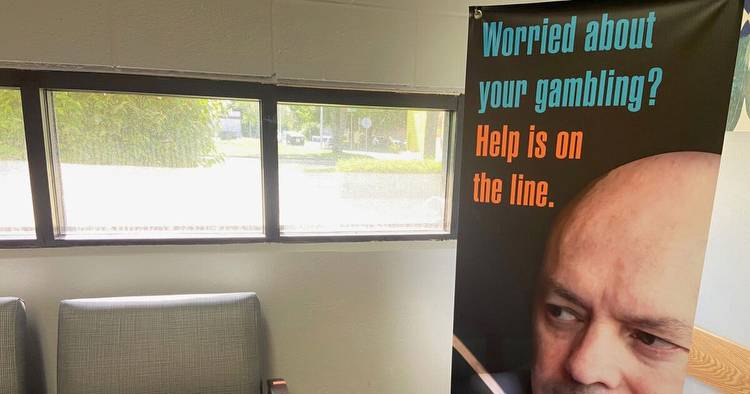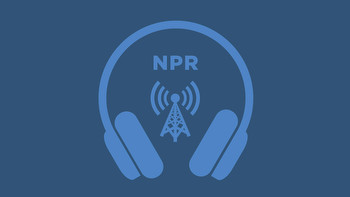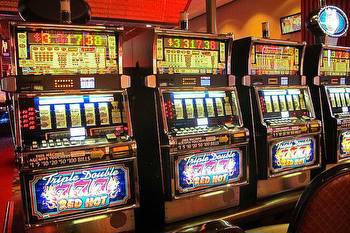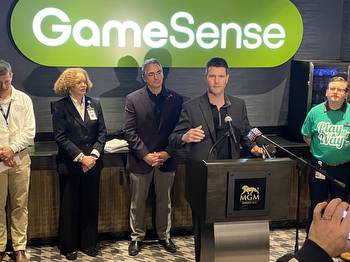Despite millions of dollars earmarked for gambling treatment in Massachusetts, few in state get help

This is the second in a three-part series. Read part one here.
The Gandara Center is one of the only mental health clinics in Springfield, Massachusetts, that offers treatment for problem gambling.
But even there, about a mile from the MGM Springfield casino, there’s only one clinician certified in gambling treatment. And she’s only treating five patients.
“There's definitely many, many more people with problem gambling,” said Enrique Vargas, a clinical supervisor at Gandara.
Vargas no longer sees patients, though in the past he has treated gambling addiction from slot machines, table games and lottery scratch tickets
“I cannot say all of them stopped gambling, but I can say that the way they made decisions about gambling was a different process,” he said, “because they considered their families more, they considered their financial decisions more.”
Still, Vargas said he’s treated fewer than a dozen of those patients in the last decade. Now, when he talks to other providers, “this is something that comes up in the conversation. Why are we not treating people? Why are people not accessing the services?”
Treatment and prevention was supposed to be a cornerstone of the state’s 2011 casino legislation. According to national surveys, Massachusetts has designated more money for that purpose than any other state.
The Massachusetts Gaming Commission reports there’s $24 million in a Public Health Trust Fund, made up of casino revenues, expressly to mitigate the harms of gambling.
The commission itself uses a quarter of the fund on research and responsible gambling efforts.
The rest — somewhere between $11 and 18 million a year, depending on which agency you ask — is in the hands of the state Department of Public Health.
‘Is the money being spent where it should be?’
“I'm not 100% certain where the money's going,” said Marlene Warner, who runs the nonprofit Massachusetts Council on Gaming and Health.
Warner's organization, previously called the Massachusetts Council on Compulsive Gambling, used to hold contracts with the state Department of Public Health (DPH) to train providers and run the gambling helpline. But now the organization gets no money from the public health agency.
Warner said her board is concerned about the current state of treatment and prevention.
“Do we have the right resources in Massachusetts? And is the money being spent where it should be?” she said.
According to state gambling research, about 2% of the population has a severe gambling addiction — the kind that ruins finances, mental health and relationships. Another 8% is considered at-risk for serious problems. That’s about a half-million people total.
But experts say only a tiny fraction of them are in treatment; the state does not track how many.
A DPH spokesperson said the agency only knows about people without insurance coverage who bill the state as what's called a "payer of last resort." For the last two years, the spokesperson said, no one has billed the state for gambling treatment.
Keith Whyte, head of the National Council on Problem Gambling, said Massachusetts did many things right in setting up gambling regulations.
“But their treatment numbers are abysmal," he said, "in spite of the fact that the amount of money that's going into the system is historic.”
‘It's a point of frustration’
So what happened?
“I'm not surprised by what you're hearing. It has to do with a lot of things,” said Victor Ortiz, who runs the Office of Problem Gambling, a division of the state Department of Public Health.
It’s Ortiz's job to distribute the funds for prevention, treatment and provider training.
“The research is telling us that the vast majority of people who experience a gambling disorder or high levels of stress related to gambling don't seek formal treatment,” Ortiz said. “It's extremely, extremely underutilized.”
State researchers, paid by the Massachusetts Gaming Commission, found fewer than 8% of problem gamblers sought treatment. And this dilemma is not unique to Massachusetts. Across the country, the National Council on Problem Gambling estimates only 0.5% of the population is in treatment, in part because of the stigma surrounding gambling addiction.
However, most states don’t have nearly as many resources for problem gambling as Massachusetts.
Ortiz said there are 150 therapists in Massachusetts who have gone through the state’s 30-hour problem gambling certification. But that’s no guarantee they’re actually providing treatment.
And it's not easy to get accurate information about providers. When NEPM called the state’s official gambling helpline and asked about treatment within 20 miles of Springfield, the operator listed four healthcare organizations. When we called those places, three said they don’t actually offer gambling treatment.
Out of the six individual therapists in the greater Springfield area listed by the helpline, one said he’s not taking new patients, two had non-working numbers, and three didn’t return our calls. Searching on the helpline’s website got similar results.
And while the DPH publishes a list of 22 health care organizations it says are contracted by the state to provide gambling treatment, at least four of them — that’s most of the western Massachusetts options — said they no longer do.
Ortiz, in an interview, said he was unaware of the discrepancies and would look into it.
“It's a point of frustration, to be candid,” said Phil Sherwood with the Massachusetts Council on Gaming and Health. “We have found a lot of the resources on the DPH Office of Problem Gambling to be outdated, inaccurate and incomplete.”
The council's director, Warner, said her staff takes calls and texts from people struggling with compulsive gambling. Most of them can’t find specialized treatment, she said.
“I don’t think we’re hearing the half of it,” Warner said.
That’s not to say people can’t go to a regular therapist, someone who’s not trained in gambling addiction, Warner said.
“I mean, it's frankly what a lot of people do in other states who don't have so much money and don't have a lot of gambling services,” she said. “They go to therapists and hope the therapist can piece together what they need to know about gambling.”
When we asked a few of the mental health clinics in western Massachusetts why they stopped offering specialized gambling treatment, they all said not enough patients were asking for it.
But at least one acknowledged they didn’t actively promote the service either.
“I'm not sure how much it was that we weren't out there visibly advertising and recruiting and building relationships with MGM and Mass Lottery and places like that to receive direct-line referrals,” said Kathy Mague, a senior vice president at Springfield-based Behavioral Health Network.
Helping people understand they need help
Low demand for treatment is not the same as low need.
Vargas, the Gandara Center supervisor, said gambling is so normalized and ubiquitous that many people don’t recognize when they’re in trouble. He encourages his clinicians to screen all mental health patients for gambling, even if that’s not why they came for help — an approach national gambling experts recommend.
But Vargas also wants the state to organize more promotional campaigns about the harms of gambling to compete with all the industry ads encouraging sports betting.
“I do believe it's the responsibility of the authorities to focus more on … helping the people understand why they need help,” Vargas said.
On one budget document, the DPH listed $2 million a year towards public awareness of problem gambling. But the department would not provide specifics — and neither did the company contracted to oversee media campaigns.
Ortiz, the DPH problem gambling director, said his office is reaching out to people through the state’s substance abuse helpline, which shares a phone number with the gambling helpline. He said every person who calls about drugs or alcohol is screened for gambling disorder, as those problems often go hand in hand.
“That is the largest expansion of problem gambling screening in the country,” he said.
However, NEPM reporters twice called the state helpline recently asking about drug and alcohol resources, and the staff person who answered did not, in fact, ask any questions about gambling.
It’s also worth noting that in the last few years, the state stopped taking part in the national gambling helpline — 1-800-GAMBLER. So now, when a Massachusetts resident calls that number, they get referred to a different call center run by the Massachusetts Council on Gaming and Health.
‘Communities are in need of our support’
The state's Office of Problem Gambling pointed out people can get help from support groups and faith-based organizations.
And Ortiz said his public health approach goes beyond treatment — focusing on community issues such as racial equity, mental health and what are known as social determinants of health. That's because many people with gambling problems also struggle with substance abuse, mental illness and poverty-related issues.
Ortiz said his office has funded 20 community initiatives across the state, and he listed a few of those in western Massachusetts, including a peer-support program in Springfield and Holyoke, a photography program for middle-school youth, and a coalition on youth mental health run by the Public Health Institute of Western Massachusetts.
“People of color are disproportionately impacted by this issue,” Ortiz said. “Communities are in need of our ongoing support. And so my 100% focus is ensuring that we continue to deliver the resources at the community level, and that's what we're committed to.”
Several advocates told me those kinds of programs are laudable but don’t address gambling directly nor help people whose behavior has destroyed marriages or life savings.
“Really, of course, you want to do both. You have to do both,” Whyte, of the National Council on Problem Gambling, said. “And eventually down the road, Massachusetts may be a leader in treatment among minority populations for gambling problems. But in the short term … it's astounding, the lack of services that are available for just any people with gambling problems.”
The city of Springfield has its own office of problem gambling, but state and city officials said it currently gets no money from the DPH or the Public Health Trust Fund, and it doesn't facilitate treatment.
The city’s gambling office previously got DPH funding to conduct a limited community-based survey on seven social issues — one of them was gambling — but that ended in 2022.
Springfield’s gambling office is instead working on a drunk-driving program through a separate state fund designated for “community mitigation,” which is administered by the Massachusetts Gaming Commission, not the DPH.
‘Do we need more services?’
When Ortiz presented his department’s work to the state’s Public Health Council last spring, at least one member had questions about its effectiveness.
“Do you have interest in actually helping to address people who have problem disorder?” asked Harold Cox, a professor and former dean of Boston University’s School of Public Health.
“I heard the framework and understand and appreciate the expanded idea that you have in thinking about social determinants of health as you address this,” Cox said during the meeting. “But ... are we getting a decrease in the number of people who are experiencing problem-gambling disorders?”
Cox went on to ask for data that shows the state’s public health programs are effective.
“Are there services that are being developed for individuals? Do we need more services across the state?” Cox asked.
Ortiz told Cox he would share more details later. Contacted by NEPM after the meeting, Cox declined to comment.
When asked later about those concerns, Ortiz said the issue is complicated.
“Yes, we are managing a significant amount of resources,” he said. “But … in order to really, really mitigate gambling, because it has such a high level of intersectionality, more resources are going to be needed in order to facilitate that.”
Trying to track the public health money
Ortiz said the DPH has invested significantly in treatment and awareness, but his office would not supply a full accounting of where its multimillion dollar budget goes nor how much of the trust fund goes unspent. NEPM has a public records request pending. (A budget the department does publish includes mostly general categories, with some outdated information.)
Even the total amount in the Public Health Trust Fund is in dispute. The state Gaming Commission said the fund had $24 million in 2023, while DPH reports the figures for that year as $17.5 million — a $7 million gap. A DPH spokesperson said the department was still using a budget projection for FY 2023, which ended in June, and the 2024 budget has yet to be finalized.
Warner said her organization tried to use public record requests to find out how the DPH spends its problem gambling money.
“We don't get very far with [the requests], to be perfectly honest, and they're costly,” she said. “So we've decided to let it go.”
Mark Vander Linden, who runs the responsible gaming division of the Massachusetts Gaming Commission, said he doesn’t know how the DPH spends its treatment money either.
Vander Linden said he hopes people in gambling recovery can get the support they need, but “is the demand being met by the service system? I would totally have to refer you back over to the Department of Public Health.”
State Rep. Marjorie Decker, who chairs the Legislature's public health committee, said, through a spokesperson, that she is engaged in “fact-finding” around the public health trust fund and did not wish to comment until that’s done.
Yet even critics of Massachusetts’ treatment numbers and budget transparency still hold the state up as a model for its attention to problem gambling.
“Everybody's, I think, trying to do the right thing,” Whyte said. “It's just the system has been so underfunded and so neglected, and people with gambling problems have been stigmatized for so long, that even just having this money, no matter how you allocated it, it may be another generation until we really get this right.”
And no other state, he added, is any closer.
In part 3 of our series, coming Friday: Massachusetts has one of the country's biggest research budgets on problem gambling, but even here, the scope has been reduced in recent years.


































